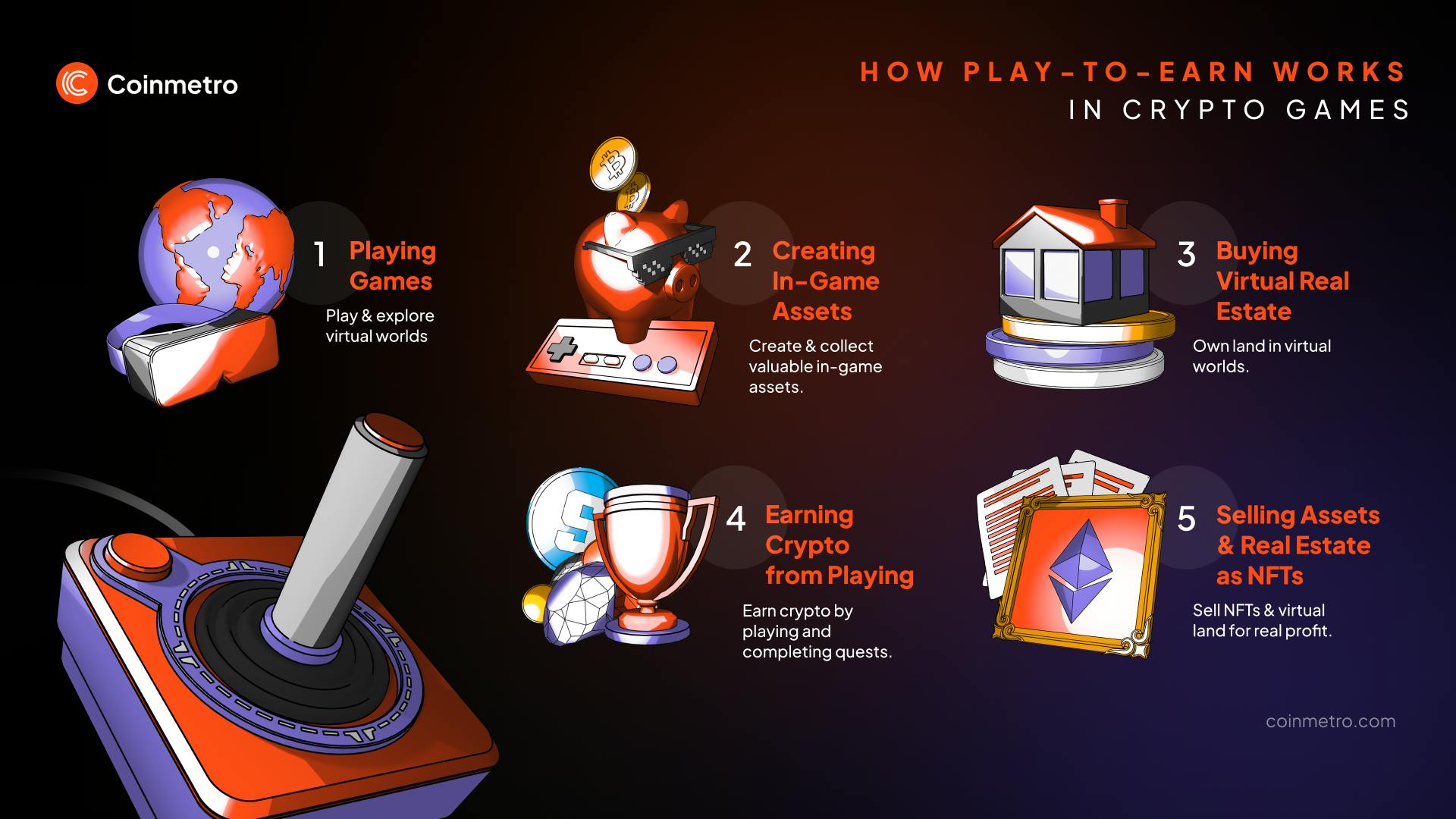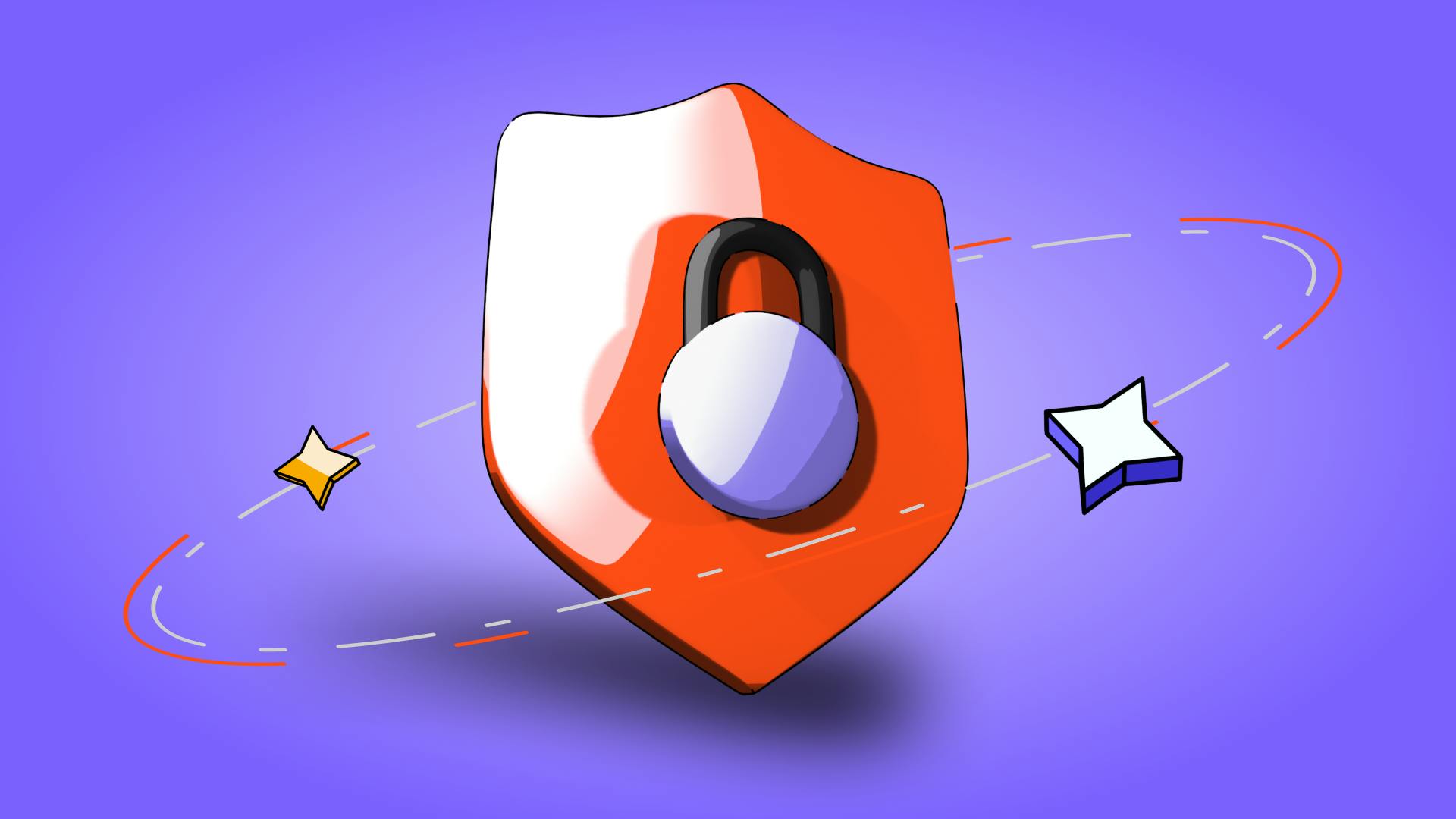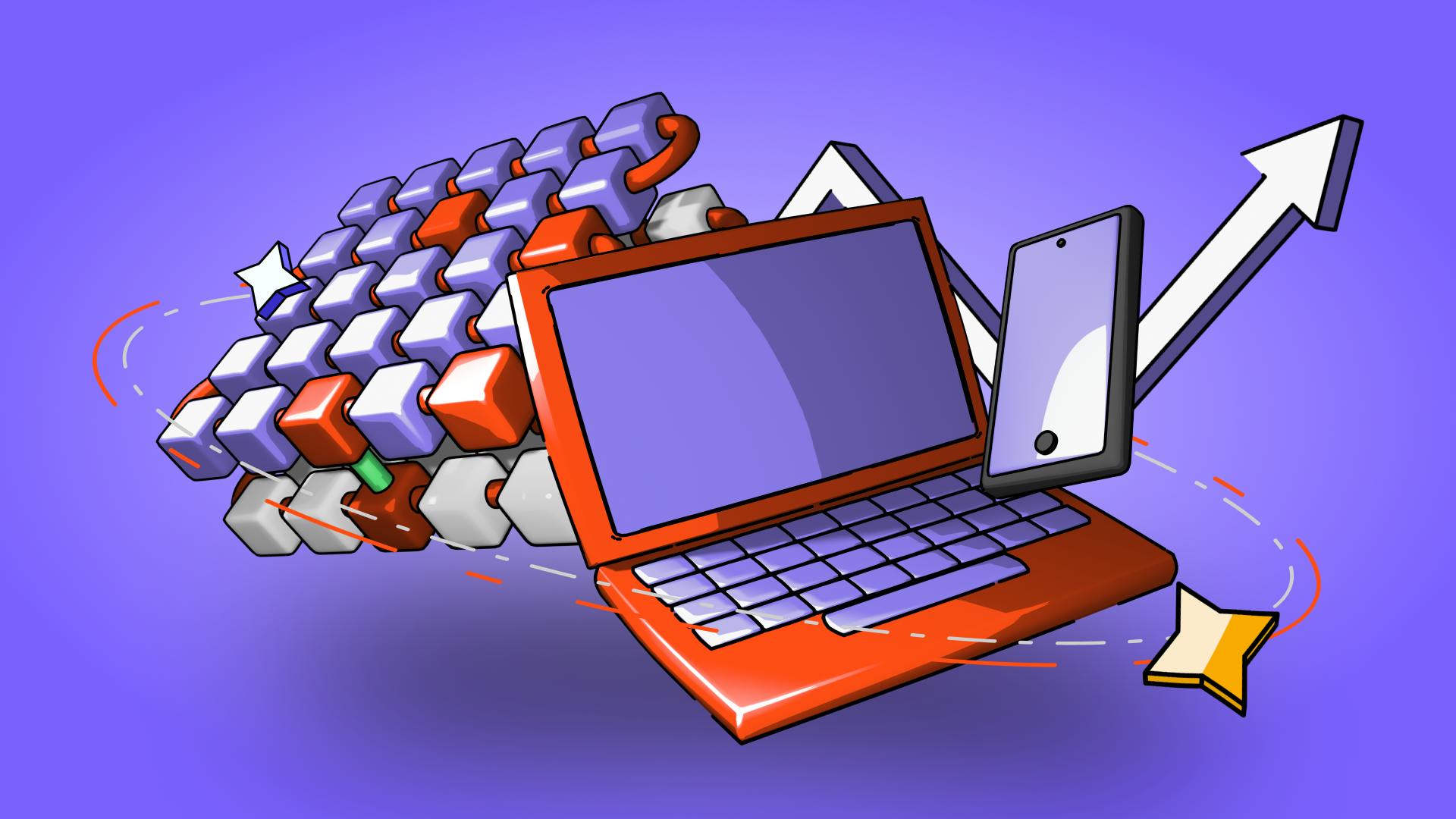3 Popular Play-to-Earn (P2E) Games in the Crypto Space
December 5, 2025

by Coinmetro Editorial Team
December 5, 2025
Blockchain technology has transformed finance and the gaming industry, introducing a new paradigm known as Play-to-Earn (P2E). This innovation allows gamers to earn real-world value while enjoying their favorite pastime. Through P2E games, players can collect, trade, and sell digital assets, making gaming entertaining and financially rewarding.
P2E games have become a significant part of the blockchain and crypto space, attracting gamers and investors. These platforms go beyond traditional gaming by offering opportunities to earn cryptocurrency and non-fungible tokens (NFTs) while fostering active communities and delivering engaging gameplay experiences. Furthermore, established brands and companies such as Samsung, Gucci, and Atari have considered it fit to prompt a space of their own in some of these virtual worlds.
Below, we explore three of the most popular P2E games currently available and the world of P2E games at large. You will learn about:
- Origin and history of Play-to-Earn (P2E) games
- Axie Infinity
- Decentraland
- The Sandbox
- The future of Play-to-Earn games
Play-to-Earn (P2E) games started by blending blockchain with gaming. The concept grew with cryptocurrencies and NFTs gaining popularity. Players can own, trade, and profit from in-game assets.
CryptoKitties, launched in 2017 by Axiom Zen, was the first major play-to-earn (P2E) game to gain widespread adoption. It allowed players to breed, collect, and trade unique digital cats, each represented as an NFT on the Ethereum blockchain. These NFTs held tangible financial value, marking an early milestone in blockchain-based gaming and digital asset ownership.
After CryptoKitties, more games used blockchain to boost player interest. Axie Infinity, launched in 2018 by Sky Mavis, set a new standard. Players earned cryptocurrency by breeding, battling, and trading digital Axies.
By 2021, Axie Infinity exploded in popularity, especially in the Philippines. Players there earned notable income through the game’s ecosystem. This success highlighted P2E’s potential for financial rewards globally.
The P2E model then merged gaming with decentralized finance (DeFi) concepts. Games like Decentraland and The Sandbox let players buy and develop virtual land. Entire economies formed within these metaverse platforms.
P2E games mark a shift in the gaming industry today. Players actively shape and benefit from in-game economies. Blockchain technology keeps expanding these earning opportunities worldwide. Now, let’s dive deep into some of the most popular titles.

Axie Infinity, developed by Sky Mavis, is a blockchain-based game launched in 2018. The game quickly gained popularity for pioneering the Play-to-Earn (P2E) model, where players earn cryptocurrency by participating. Inspired by Pokémon, Axie Infinity allows players to collect, breed, and battle fantastic digital creatures called Axies. Each Axie is an NFT (Non-Fungible Token), giving players true ownership of their in-game assets. This concept of digital ownership and the ability to monetize gameplay has positioned Axie Infinity as a flagship P2E game in the crypto space.
In Axie Infinity, players use their Axies to battle in teams of three. The game revolves around strategy, with players considering each Axie's abilities, strengths, and weaknesses to outmaneuver their opponents. Besides battling, players can breed Axies, creating new offspring with unique traits, which can be used in-game or sold on the marketplace.
The game features two primary tokens: Smooth Love Potion (SLP) and Axie Infinity Shards (AXS). Players earn SLP by winning battles, which is used for breeding new Axies. AXS serves as the governance token, allowing holders to vote on game development decisions and participate in staking for rewards. These tokens are tradable on various crypto exchanges, translating in-game success into real-world financial gains.
One of Axie Infinity's most attractive features is its earning potential. Players earn SLP through daily quests, battling in the Arena, and breeding Axes. The value of SLP fluctuates based on market demand, but dedicated players have made significant income, especially in regions where traditional employment offers lower wages. AXS, on the other hand, offers long-term earning potential through staking, governance participation, and its broader use within the Axie ecosystem.
The game's popularity peaked in 2021, with some players earning enough to replace their full-time income as the pandemic was in full swing. However, the value of earnings is subject to market volatility, and players must consider the risks involved in both gameplay and token investments.
Axie Infinity boasts a large and active community, particularly in Asia. The community's strength is reflected in the game's marketplace activity, social media presence, and ongoing development by Sky Mavis. The game's success has spurred the growth of the broader P2E market, inspiring the development of similar games and bringing attention to the potential of blockchain technology in gaming.
Earning Opportunities: Axie Infinity offers tangible financial rewards through gameplay.
Ownership: Players own their Axies as NFTs, allowing for real asset ownership in the game.
Community Support: The game has a strong, active community that provides resources, guides, and support for new players.
Market Volatility: Earnings from SLP and AXS are subject to crypto market fluctuations, which can impact income stability.
Initial Investment: Starting the game requires purchasing Axies, which can be expensive, especially during market peaks.
Game Complexity: The game has a learning curve that can be challenging for newcomers.
Axie Infinity remains a leading P2E game, but potential players should carefully weigh the pros and cons before investing time and resources.
In March 2022, Axie Infinity suffered a major security breach. The Ronin Network, its underlying blockchain, was hacked by attackers. They exploited weaknesses, stealing around $620 million in cryptocurrency.
This incident exposed risks tied to blockchain technology. It sparked greater scrutiny of security practices across the industry. Many began questioning the safety of decentralized systems.
Sky Mavis, the developer of Axie Infinity, acted swiftly. They partnered with law enforcement to address the breach. Enhanced security measures were introduced to prevent future attacks.
Despite the setback, Axie Infinity has shown resilience. The game continues to grow and attract users.
Decentraland is a virtual world powered by the Ethereum blockchain. Users buy, sell, and develop virtual land in a community-governed space. Each land parcel, called LAND, is an NFT, granting full ownership and control. This setup lets users build anything from art galleries to interactive games. Decentraland stands as a pioneer in the metaverse space. Its decentralized model ensures users shape the platform's future.
In Decentraland, users engage by purchasing and developing land plots. They can create digital assets like 3D models, games, or applications on each land. These creations can then be sold or leased for profit.
Users also join events, host exhibitions, or run virtual businesses. The platform provides tools to design immersive experiences that draw visitors. This fosters engagement and opens revenue streams for creators.
Decentraland offers multiple earning opportunities within its ecosystem. Users can buy, develop, and sell LAND (tokenized virtual real estate) for profit, as well as monetize content, host events, and offer virtual services. The platform operates with two tokens: LAND, representing virtual real estate, and MANA, which is used for transactions, governance, and acquiring virtual goods and services.
Users earn MANA by selling assets, joining events, or trading NFTs. MANA and LAND values can rise or fall, presenting both risks and rewards. Creators can also sell NFTs, stake tokens, or engage in DeFi activities.
Decentraland has a vibrant global community of users and creators. It hosts events like music festivals, art exhibitions, and corporate gatherings. These attract casual visitors and serious investors alike.
The platform has become a hub for virtual commerce and innovation. Brands purchase LAND to connect with digital audiences. This drives collaboration and growth within the ecosystem.
Samsung built a virtual headquarters to showcase its innovations. Sotheby’s opened a digital gallery mirroring its London space for NFT art. Atari recreated classic games, letting users play iconic titles.
JP Morgan launched a virtual lounge, showing financial sector interest. These moves highlight Decentraland’s role as a key metaverse platform. Brands see it as a way to engage tech-savvy users.
User Ownership: Decentraland offers complete ownership of virtual land and assets, allowing users to monetize their creativity.
Decentralized Governance: The platform is governed by a DAO (Decentralized Autonomous Organization), giving users a say in its future development.
Diverse Earning Opportunities: Users can earn through various channels, including LAND trading, MANA staking, and NFT sales.
Market Volatility: The value of MANA and LAND is subject to fluctuations, which can impact earning potential.
High Entry Costs: Acquiring LAND and developing it requires an initial investment, which may be prohibitive for some users.
Complexity: Building and monetizing virtual assets in Decentraland requires a certain level of technical skill and creativity, which may pose a barrier to entry for some users.
The Sandbox is a community-driven platform that empowers users to create, own, and monetize their gaming experiences. Developed by Pixowl and later acquired by Animoca Brands, The Sandbox began as a mobile game but has since evolved into a full-fledged virtual world built on blockchain technology. Just like Decentraland, this platform allows players to own virtual land, create games, and develop assets, all of which can be traded or sold as NFTs. The Sandbox emphasizes user-generated content, making it a cornerstone of the growing metaverse ecosystem where creativity and ownership are central.
The Sandbox provides users with powerful tools to create and monetize their content. VoxEdit is a 3D voxel modeling software that lets players create assets such as characters, buildings, and items. These assets can then be exported as NFTs and sold in the marketplace. The Game Maker is another essential tool that allows users to design and develop interactive experiences, ranging from simple games to complex virtual worlds. These games can be shared with the community, and creators can earn revenue based on user engagement and participation.
Earning in The Sandbox comes through various channels. Users can buy, develop, and monetize virtual real estate, creating interactive experiences that generate revenue. The platform's native token, SAND, is used for transactions, staking, governance, and purchasing in-game assets, providing multiple earning opportunities
Additionally, creators can sell their NFTs, such as assets made in VoxEdit, on The Sandbox marketplace. Another revenue stream is participating in events and competitions, where users can earn rewards in SAND. The token can be used within the ecosystem or traded on cryptocurrency exchanges, offering real-world financial returns. The Sandbox’s focus on user-generated content and ownership creates diverse earning opportunities for players.
The Sandbox boasts a strong and engaged community that is crucial to its growth. The platform has also partnered with several high-profile brands and celebrities, boosting its visibility and appeal. Notable partnerships include collaborations with Atari, Ubisoft, Gucci, and Snoop Dogg, all of which have created virtual experiences within The Sandbox. These partnerships enhance the platform’s ecosystem and attract new users and creators, fostering a vibrant and collaborative community.
Creative Freedom: The Sandbox offers extensive tools for creating and monetizing content, allowing users to express their creativity fully.
Diverse Earning Opportunities: Users can earn through land ownership, asset creation, and participation in events, providing multiple revenue streams.
Strong Partnerships: Collaborations with well-known brands and celebrities add credibility and attract a broader audience.
High Competition: As the platform grows, the competition among creators and landowners increases, making it harder for newcomers to stand out.
Entry Costs: Acquiring LAND and developing assets require an initial investment, which can be a barrier for some users.
Market Volatility: The value of SAND and NFTs can fluctuate significantly, impacting the potential for stable earnings.
The Sandbox is a dynamic and user-driven platform with significant earning potential, but users should be prepared for the competitive nature of the market and the initial costs involved in establishing a presence.
Play-to-Earn (P2E) games are changing how people interact with digital entertainment. These platforms allow players to earn money while playing video games. Games like The Sandbox and Decentraland show how players can create, own, and profit from digital assets.
Blockchain technology is making P2E games more powerful, secure, and attractive. Major brands and game developers are investing in this new approach. Players can now turn their gaming skills into real financial opportunities.
Navigating the play-to-earn (P2E) gaming market demands careful consideration of market volatility, initial investment requirements, and the sustainability of in-game economies. Careful research helps gamers make smart decisions about these new gaming platforms.
As technology improves, P2E games will become more complex and exciting. New games will offer more ways to earn real money through playing. P2E represents a significant shift in how we think about gaming. It connects entertainment, technology, and personal finance in exciting new ways. For gamers and investors willing to learn, these platforms offer unique opportunities.
▶️ Watch: 6 BEST NFT Crypto Games To Play in 2024 | Play-to-Earn
Join the Coinmetro community on Discord and Telegram, where forward-thinking traders and investors gather to share insights, explore new opportunities, and dive deep into cryptocurrencies. Should you need any help, please contact our world-class Customer Support Team via 24/7 live chat or email at hello@coinmetro.com.
To become a Coinmetro user today, Sign Up now or head to our new Exchange if you are already registered to experience our premium trading platform.
Tags
Related Articles

Regulatory Sandboxes: Fostering Crypto Innovation Within Legal Frameworks
The cryptocurrency industry’s fast rise fuels an important debate. Innovation aims to transform finance, enhancing speed and access. Yet, regulators…
5m

Crypto Options Trading: Strategies and Market Insights
Cryptocurrency markets have rapidly expanded beyond simple buying and selling. One of the most significant developments has been the rise of…
6m

The Rise of Social-Fi: Blending Social Media with Decentralized Finance
In recent years, social media and finance have started to merge, creating Social-Fi. This concept blends the engagement of social platforms with…
6m

DeFi Insurance Platforms to Watch in 2024
Decentralized Finance (DeFi) insurance addresses the growing need for insurance against hacks, smart contract failures, and other DeFi-related risks.…
7m